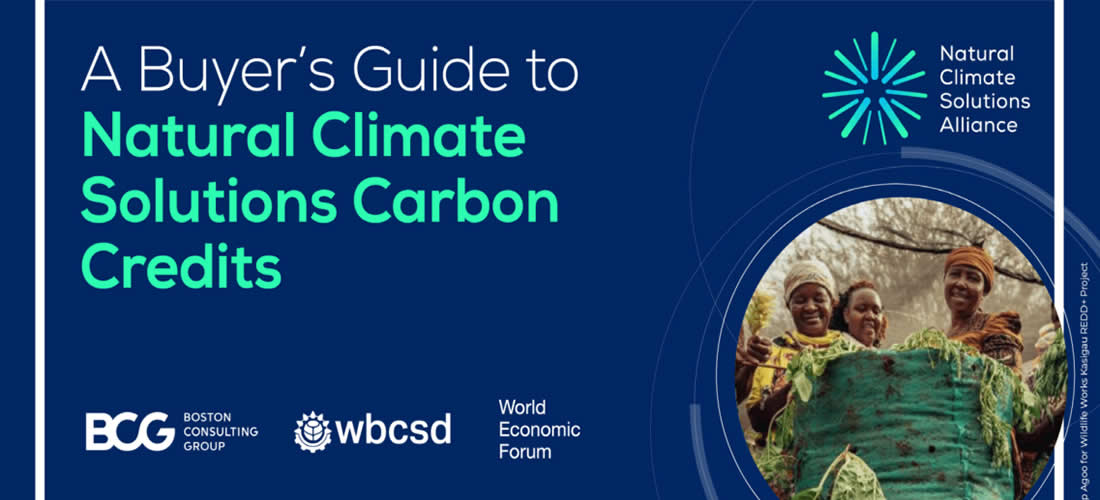New York, 15 March 2023: Today at the Corporate Investments into Biodiversity & Forestry (CIFB) summit, the Natural Climate Solutions Alliance (NCSA), in collaboration with Boston Consulting Group (BCG), and the support of the World Business Council for Sustainable Development (WBCSD) and the World Economic Forum (WEF) released new guidance ‘A Buyer’s Guide to Natural Climate Solutions Carbon Credits’. This guide provides practical information to support businesses as they navigate the procurement process for high-quality NCS carbon credits that meet the tripartite goals of climate change mitigation, biodiversity gains and benefits to people.
Natural Climate Solutions (NCS) are a subset of Nature-based Solutions (NbS) that lead to biodiversity gains, benefits for people and climate change mitigation. While contributing to halting and reversing the global loss of biodiversity, natural climate solutions also play a central role in climate change mitigation, in particular to help us move from 12.5 Gt of emissions from land each year to net zero emissions by 2030.
Financing for NCS currently stands at approximately USD$ 154 billion compared to the estimated USD$ 674 billion needed by 2030 to achieve the true mitigation potential of nature. Companies can help close this funding gap by purchasing NCS carbon credits on the voluntary carbon market to complement their yearly abatement efforts, by counterbalancing their unabated annual emissions in line with their science-based targets.
“Natural climate solutions offer a win-win-win approach to tackling climate change, halting biodiversity loss and providing benefits to local communities and Indigenous People. By restoring and protecting forests, wetlands, and other natural habitats, we can not only capture and store carbon, but also provide a range of co-benefits to people and wildlife.” Giulia Carbone, Director Natural Climate Solutions Alliance
However, the voluntary carbon market is complex and rapidly evolving, and businesses often perceive the procurement of high-quality NCS carbon credits as a high-risk / low-return decision.
In eight steps, the guide highlights how to identify high-quality NCS carbon credits and perform due diligence to avoid the risks of purchasing low-quality credits. The guide directs companies to resources and third parties that can provide additional support during the procurement process. Recognizing that the benefits for biodiversity and people are central to the success of an NCS project or program, the guide zooms in the questions that a company could ask as part of its due diligence process.
“Companies can play a meaningful role in closing the climate and nature finance gap, but they’re increasingly afraid of unintentionally making the wrong investment or being accused of greenwashing. This guide demystifies the Voluntary Carbon Market, equipping companies with the right steps and risk-management strategies to incorporate high-quality natural climate solutions carbon credits into their climate efforts and maximize their impact.” Paulina Ponce de Léon, Managing Director and Partner, Boston Consulting Group
The guidance is a result of a collaboration among stakeholders from all stages of the Voluntary Carbon Market (VCM), with expertise in biodiversity and social issues and carbon integrity, including project developers, carbon-crediting programs, market intermediaries, NGOs and buyers.
By following a rigorous, disciplined approach, such as the one proposed in this guide, and maintaining active involvement, companies can move forward in investing in high-quality projects and programs that will help address the gap in net-zero GHG emission targets.
The organizations that participated in the development of this guide are: Abatable, Bayer, Botanic Gardens Conservation International, BP, Ceres, ClimateSeed, Climate Impact X, CO2.com, Conservation International, Ecosphere+, EDF, Emergent, ENI, Fauna & Flora International, Forest Trends, Gold Standard Foundation, Indigo Ag, McCain, McKinsey & Co, Mesoamerican Alliance, Mitsubishi Corporation, Native, Nature Metrics, Netflix, Oil and Gas Climate Initiative, Pachama, PwC, RESPIRA, Revalue Nature, Rio Tinto, Salesforce, South Pole, SwissRe, Sylvera, The Biodiversity Consultancy, The Nature Conservancy, UNEP WCMC, Unilever, Verra, VNV Advisory, WeMeanBusiness Coalition, Wildlife Conservation Society, Wildlife Works, Winrock, World Resources Institute
Source: wbcsd.org
 En
En Cs
Cs